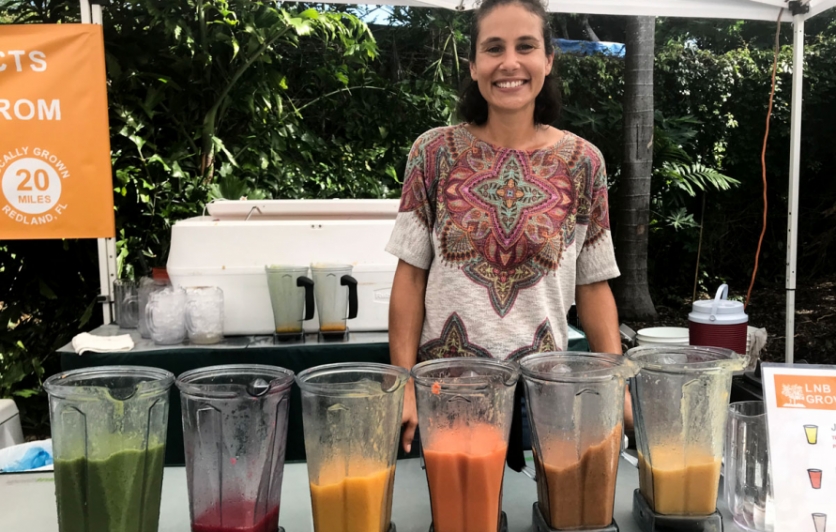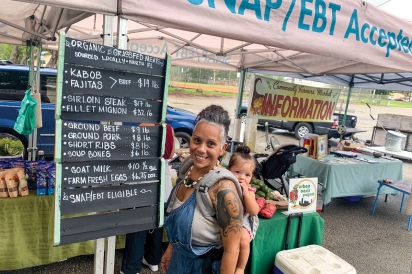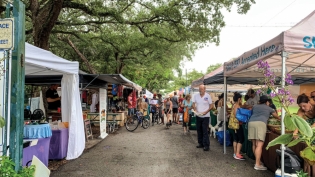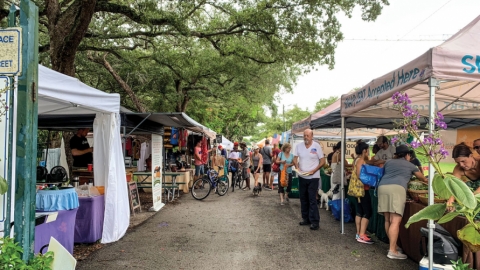What Makes a Good Farmers Market?
No two farmers markets look alike, says Sharon Yeago, a local foods consultant. Big or small, each should be representative of the community. Some key components:
Local farmers who sell what they grow. “Ask where it’s grown, how it’s grown, what you do with it,” says Yeago. “If they can’t answer, they’re not the grower.” If the market doesn’t have local farmers, find out who owns the market and talk to them. “Tell them ‘I like my market, but you’re not supporting local farms,’” she says.
Fruits and veggies that are clearly labeled where they came from. Market managers can insist their vendors take this extra step toward transparency to build trust with consumers.
Food artisans using local products. Honey, kombucha, smoothies, baked goods, jams and jellies, sauces are all examples of artisan foods.
SNAP/EBT (food stamps) and Fresh Access Bucks for local produce. These programs ensure fair food for all.
Attractive tents and displays that entice customers. “Part of our policy is to have green and white tablecloths,” says Claire Tomlin of The Market Company. Customers appreciate a professional look. At the Saturday Morning Market, booths must be well-designed and eye-catching, with friendly, outgoing staff.
Sustainable practices for vendors and customers. Eliminate single-use plastic bags, plastic sample cups and styrofoam and reducing market-generated waste.
Family activities that bring everyone together. “People look forward to our market and stay for lunch,” say Carolina Labrador and Rosie Felipe of the Key Biscayne Community Church, which hosts the Saturday market.
Carefully selected food vendors. “We specifically select food vendors for their nutritional value,” says Gail Eggeman of the Saturday Morning Market. That means no deep-fried foods.
Demos, presentations, workshops. Knitting, ASL, tai chi are activities the Southwest Community Farmers Market is exploring, says Annick Sternberg. “You create a place where people can buy produce, discuss sustainable issues, art and culture. As long as it’s local, we’re supportive.” At the Saturday Morning Market, they created a food demo cart for chef demos. Miami Seed Share is a fixture at the Legion Park Farmers Market.
Camaraderie. Market vendors support each other. Cristina Ivory of Angry Booch is using local farmers for her kombucha and ferments. “I love supporting local farms for so many reasons, and I would like to see them stick around.”
Flexibility. Unpredictable weather and other events happen. “On a bad day, you don’t squeeze the vendors. We do offer breaks,” say Annick Sternberg and Sergio Mojica of the Southwest Community Farmers Market.
Creating a sense of community. “Connecting with people passionate about their product, whether it’s produce, soap or kombucha, make markets more meaningful,” says Walt Chefitz of LNB Groves.
Staying on top of resources. Florida Organic Growers and its Florida Farmers Market Association offer managers resources to grow and develop better markets in the state. The national Farmers Market Coalition and the American Farmland Trust provide extensive online resources.








